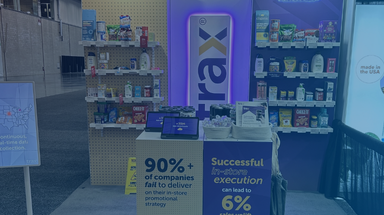
At the Summit Latin America, a workshop titled “Conquering the Latin American Market,” presented by Trax and Kraft Heinz, was held. This workshop provided deep insight into how a company can successfully expand in a region as diverse and challenging as Latin America. Below, we summarize the key points discussed by Rifka Bernstein VP of Account Management at Trax, and Nicolás Aranguren, Director of Hispanic Categories for Kraft Heinz.
History and Growth Strategy
Aranguren, with a background in industrial engineering and an MBA from HEC, has held various positions at Kraft Heinz in Europe and Latin America. Since 2021, the company has set itself an ambitious goal: to grow by double digits. The strategy to achieve this growth was based on three fundamental pillars:
- Prioritization: Identify and focus on key markets and categories
- Team: Promote a strong corporate culture aligned with growth objectives
- Clear Metrics: Establish and track specific KPIs to ensure effective execution
Prioritization
Aranguren highlighted the importance of prioritization in a region with so much geographic and cultural diversity. Clearly defining the countries and categories to prioritize, establishing a detailed schedule and mobilizing flexible resources were essential steps for success. Implementing Trax technology allowed KraftHeinz to analyze data in real time, adjusting strategies efficiently and effectively.
Team and Culture
Corporate culture was another crucial point. KraftHeinz seeks individuals who share the vision for growth and who are ambitious and innovative. Aranguren emphasized that everyone in the organization must feel responsible for the overall success, not just their specific area. This approach has been key to building a cohesive team committed to the company’s objectives.
Clear Metrics
Finally, implementing clear metrics has allowed Kraft Heinz to transform its business. From top management to the lowest levels, all employees have specific KPIs related to execution and distribution. The use of analytical tools provided by Trax has facilitated effective communication and full alignment around business objectives.
Challenges and Tips for other Companies
One of the main challenges in implementing performance measurement at the point of sale was organizational change. Ensuring that everyone in the company understands and uses the tools available is vital. Aranguren shared several tips for other companies looking to standardize and implement execution programs in multiple countries:
- Understand specific needs: Identify which categories and markets need the most attention
- Start small: Implement the program in phases, avoiding overloading KPIs and countries from the beginning
- Be flexible and adaptive: Be willing to adjust strategies and objectives as necessary.
Conclusion
The workshop concluded with a question and answer session, where Kraft Heinz’s challenges and learnings in the region were discussed in detail. The company’s experience shows that, with a well-defined strategy, a committed team and the use of analytical data provided by Trax, it is possible to conquer the complex Latin American market.
In short, success in Latin America depends on a combination of strategic prioritization, a strong corporate culture, and the effective use of metrics. Companies that can adopt these principles will be best positioned to grow and prosper in this dynamic region.
En cumbre Summit Latin America, se llevó a cabo un taller titulado “Conquistando el Mercado Latinoamericano,” presentado por Trax y Kraft Heinz. Este taller brindó una perspectiva profunda sobre cómo una empresa puede expandirse exitosamente en una región tan diversa y desafiante como América Latina. A continuación, resumimos los puntos clave discutidos por Rifka Bernstein VP de Account Management en Trax, y Nicolás Aranguren, Director de Categorías Hispanas para Kraft Heinz.
Historia y Estrategia de Crecimiento
Aranguren con formación en ingeniería industrial y un MBA en HEC ha ocupado diversas posiciones en KraftHeinz en Europa y Latinoamérica. Desde 2021, la empresa se propuso un objetivo ambicioso: crecer a doble dígito. La estrategia para lograr este crecimiento se basó en tres pilares fundamentales:
- Priorización: Identificar y enfocarse en los mercados y categorías clave.
- Equipo: Fomentar una cultura corporativa fuerte y alineada con los objetivos de crecimiento.
- Métricas Claras: Establecer y seguir KPIs específicos para garantizar la ejecución efectiva.
Priorización
Aranguren destacó la importancia de la priorización en una región con tanta diversidad geográfica y cultural. Definir claramente los países y categorías a priorizar, establecer un cronograma detallado y movilizar recursos flexibles fueron pasos esenciales para el éxito. La implementación de tecnología de Trax permitió a Kraft Heinz analizar datos en tiempo real, ajustando estrategias de manera eficiente y efectiva.
Equipo y Cultura
La cultura corporativa fue otro punto crucial. KraftHeinz busca individuos que compartan la visión de crecimiento y que sean ambiciosos e innovadores. Aranguren enfatizó que todos en la organización deben sentirse responsables del éxito general, no solo de su área específica. Este enfoque ha sido clave para construir un equipo cohesionado y comprometido con los objetivos de la empresa.
Métricas Claras
Finalmente, la implementación de métricas claras ha permitido a Kraft Heinz transformar su negocio. Desde la alta dirección hasta los niveles más bajos, todos los empleados tienen KPIs específicos relacionados con la ejecución y distribución. El uso de herramientas analíticas proporcionadas por Trax ha facilitado una comunicación eficaz y una alineación total en torno a los objetivos empresariales.
Desafíos y Consejos para Otras Empresas
Uno de los principales desafíos al implementar la medición de la ejecución en el punto de venta fue el cambio organizacional. Asegurarse de que todos en la empresa comprendan y utilicen las herramientas disponibles es vital. Aranguren compartió varios consejos para otras empresas que buscan estandarizar e implementar programas de ejecución en múltiples países:
- Comprender las necesidades específicas: Identificar qué categorías y mercados necesitan mayor atención.
- Empezar pequeño: Implementar el programa en fases, evitando la sobrecarga de KPIs y países desde el inicio.
- Ser flexible y adaptativo: Estar dispuesto a ajustar estrategias y objetivos según sea necesario.
Conclusión
El taller concluyó con una sesión de preguntas y respuestas, donde se discutieron en detalle los desafíos y aprendizajes de Kraft Heinz en la región. La experiencia de la empresa demuestra que, con una estrategia bien definida, un equipo comprometido y el uso de datos analíticos proporcionados por Trax, es posible conquistar el complejo mercado latinoamericano.
En resumen, el éxito en América Latina depende de una combinación de priorización estratégica, una cultura corporativa fuerte y el uso eficaz de métricas. Las empresas que puedan adoptar estos principios estarán mejor posicionadas para crecer y prosperar en esta región dinámica.






